Unit1 Etiquette in Language Communication 拓展 精讲
新编实用英语综合教程2 -Unit 1 Invitation Etiquette教案

Unit 1 Invitation EtiquetteUnit GoalsWhat you should learn to doMake an oral invitation to:Invite people to join daily activitiesInvite people to formal occasionsMake a written invitation(write an invitation card or a letter) for:Personal invitationOfficial occasionsGive a reply to:An oral invitationA written invitationWhat you should know aboutInvitation culture:western and ChineseWord order in a subordinate clauseRequirements:After learning this unit, students should grasp:1.Read and understand the meaning of invitation cards and letters2.How to write invitation cards and letters and remember the patterns of invitation cards and letters3.How to invite people to party or dinner,and how to accept and decline invitations4.The customs of inviting people in different countries5.Important words,phrases and language points in the passageIn our daily life,we need to invite others to dinner or take part in all kinds of parties, so we should know about western custom about invitation.Foreign custom is much stricter than Chinese custom in the matter of replying toinvitations。
2016中职英语拓展模块(高教版)授课教案:Unit1SocialCommunication
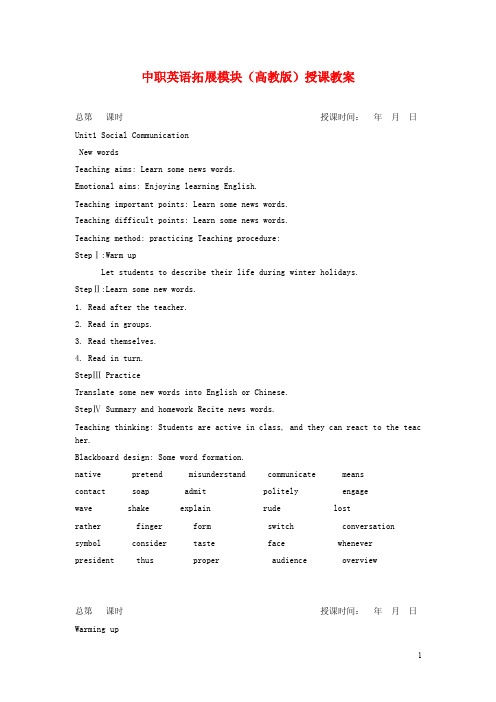
中职英语拓展模块(高教版)授课教案总第课时授课时间:年月日Unit1 Social CommunicationNew wordsTeaching aims: Learn some news words.Emotional aims: Enjoying learning English.Teaching important points: Learn some news words.Teaching difficult points: Learn some news words.Teaching method: practicing Teaching procedure:StepⅠ:Warm upLet students to describe their life during winter holidays.StepⅡ:Learn some new words.1. Read after the teacher.2. Read in groups.3. Read themselves.4. Read in turn.StepⅢ PracticeTranslate some new words into English or Chinese.StepⅣ Summary and homework Recite news words.Teaching thinking: Students are active in class, and they can react to the teac her.Blackboard design: Some word formation.native pretend misunderstand communicate meanscontact soap admit politely engagewave shake explain rude lostrather finger form switch conversation symbol consider taste face whenever president thus proper audience overview总第课时授课时间:年月日Warming upTeaching aims: Learn some news words.Emotional aims: Learn some manners in language communication.Teaching important points: Discuss some questions.Teaching difficult points: Learn some news words.Teaching method: practicing and discussing.Teaching procedure: StepⅠRevisionReview some words.StepⅡ Discussion 讨论课文插图Now look at the picture in the reading text "Etiquette in Language Communic ation".What can you see in it?-From the picture, we can see a woman is talking with a man. But the manlooks a bit uneasy, maybe he is nervous. Obviously it's not a smooth language c ommunication.StepⅢ提示相关生词和短语,如:native speaker, native language, have trouble in doing sth, pretend to do sth, repeat, explain, manner等。
2023外研版英语必修一unit1 using language教案

2023外研版英语必修一unit1 using language教案
一、教学目标:
1. 学生能够理解和使用单元主题相关的词汇和表达方式。
2. 学生能够掌握本单元中使用的语法结构和句式。
3. 学生能够运用所学知识进行口头和书面表达,提高英语综合能力。
二、教学内容:
本单元的Using Language部分包括一篇阅读文章和相应的练习。
阅读文章主要讲述了一位学生在学校图书馆发现了一本神奇的书,通过这本书,他获得了许多有趣的知识和技能。
文章中涉及到的语法结构和词汇都比较丰富,学生可以通过阅读和练习来巩固所学知识。
三、教学步骤:
1. 导入:首先,通过简单的对话或问题引入本单元的主题和阅读文章的内容。
2. 词汇学习:讲解文章中出现的生词和短语,帮助学生理解和记忆。
可以通过图片、视频、例句等方式进行展示和讲解。
3. 阅读理解:让学生阅读文章,并回答提前准备的一些问题,检查学生对文章的理解程度。
4. 语法结构学习:讲解文章中使用的语法结构和句式,可以通过例句、练习等方式进行巩固和练习。
5. 练习完成:让学生完成一些与文章相关的练习题,如填空、选择、改写句子等,以检验学生的学习成果。
6. 总结回顾:最后,回顾本节课所学的内容和重点,鼓励学生运用所学知识进行口头和书面表达。
四、教学反思:
课后,教师需要对本节课的教学情况进行反思,找出不足和需要改进的地方,以提高教学效果。
以上就是《2023外研版英语必修一unit1 using language教案》的教学思路,希望能对您有所帮助。
Unit 1 Etiquette in Language communication译文
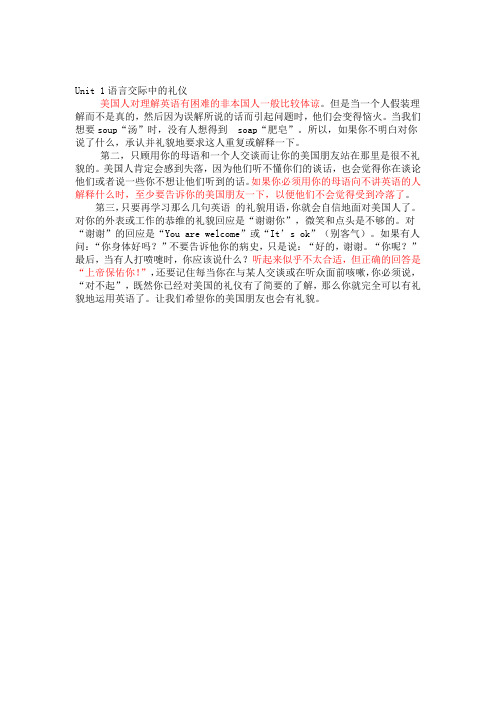
Unit 1语言交际中的礼仪
美国人对理解英语有困难的非本国人一般比较体谅。
但是当一个人假装理解而不是真的,然后因为误解所说的话而引起问题时,他们会变得恼火。
当我们想要soup“汤”时,没有人想得到soap“肥皂”。
所以,如果你不明白对你说了什么,承认并礼貌地要求这人重复或解释一下。
第二,只顾用你的母语和一个人交谈而让你的美国朋友站在那里是很不礼貌的。
美国人肯定会感到失落,因为他们听不懂你们的谈话,也会觉得你在谈论他们或者说一些你不想让他们听到的话。
如果你必须用你的母语向不讲英语的人解释什么时,至少要告诉你的美国朋友一下,以便他们不会觉得受到冷落了。
第三,只要再学习那么几句英语的礼貌用语,你就会自信地面对美国人了。
对你的外表或工作的恭维的礼貌回应是“谢谢你”,微笑和点头是不够的。
对“谢谢”的回应是“You are welcome”或“It’s ok”(别客气)。
如果有人问:“你身体好吗?”不要告诉他你的病史,只是说:“好的,谢谢。
“你呢?”最后,当有人打喷嚏时,你应该说什么?听起来似乎不太合适,但正确的回答是“上帝保佑你!”,还要记住每当你在与某人交谈或在听众面前咳嗽,你必须说,“对不起”,既然你已经对美国的礼仪有了简要的了解,那么你就完全可以有礼貌地运用英语了。
让我们希望你的美国朋友也会有礼貌。
大英新视野大一unit1知识点
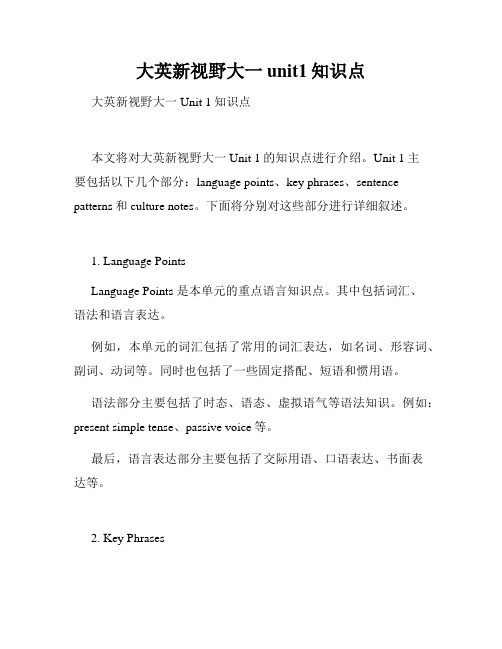
大英新视野大一unit1知识点大英新视野大一Unit 1知识点本文将对大英新视野大一Unit 1的知识点进行介绍。
Unit 1主要包括以下几个部分:language points、key phrases、sentence patterns和culture notes。
下面将分别对这些部分进行详细叙述。
1. Language PointsLanguage Points 是本单元的重点语言知识点。
其中包括词汇、语法和语言表达。
例如,本单元的词汇包括了常用的词汇表达,如名词、形容词、副词、动词等。
同时也包括了一些固定搭配、短语和惯用语。
语法部分主要包括了时态、语态、虚拟语气等语法知识。
例如:present simple tense、passive voice等。
最后,语言表达部分主要包括了交际用语、口语表达、书面表达等。
2. Key PhrasesKey Phrases 是本单元的重点短语。
通过掌握这些短语,能更好地理解和应用在实际生活或者学习当中。
例如:in addition、as a result、on the other hand等常用的关键短语。
3. Sentence PatternsSentence Patterns 是本单元的重点句型。
这些句型可以帮助学生提高语言表达的能力。
例如:It is + adj. + to do sth.、Not only...but also...等句型。
4. Culture NotesCulture Notes 是本单元的文化知识点。
通过了解和学习这些文化知识,可以更好地了解和理解英语国家的文化背景。
例如:英语国家的传统节日、习俗等。
在学习大英新视野大一Unit 1知识点时,可以通过阅读教材中的相关内容,积极参与课堂讨论和活动,或者通过参考外部资源进行拓展学习。
同时,可以结合练习题和模拟考试来检验自己的学习效果,及时总结和反思,提高英语学习的能力。
总结起来,大英新视野大一Unit 1知识点包括Language Points、Key Phrases、Sentence Patterns和Culture Notes。
外研版高一必修一module1知识点

外研版高一必修一module1知识点外研版高一必修一Module 1 知识点Module 1 知识点概述:Module 1 是高中英语必修一课程的第一个模块,主要介绍了关于国际友谊和文化差异的知识点。
通过学习本模块的内容,我们可以了解不同国家的文化特点,培养跨文化交流的能力,拓宽我们的国际视野。
一、国家与国家之间的友谊与合作1. 国内外友好交流:在国际交往中,重视友好交流对于不同国家之间的合作非常重要。
友好交流可以促进国与国之间的互信,增进了解,推动合作,共同发展。
2. 国际组织与合作:国际组织是促进国与国之间友好合作的重要机构。
比如联合国、世界贸易组织等国际组织,它们的目标是维护国际和平与安全,促进各国合作与发展。
二、文化差异与文化交流1. 文化差异的认识:不同国家的文化差异体现在语言、思维方式、宗教信仰、习俗礼仪等方面。
了解文化差异有助于我们更好地进行国际交流与合作。
2. 跨文化交际的重要性:跨文化交际是指跨越语言和文化差异进行有效交流的能力。
跨文化交际能够促进国际友谊,增进彼此理解,有效解决合作中出现的问题。
三、节日与礼仪1. 各国传统节日:不同国家有各种各样的传统节日,比如中国的春节,美国的感恩节,英国的复活节等。
了解各国传统节日有助于增进我们对其他文化的了解。
2. 各国礼仪习俗:礼仪是指特定社会和文化环境下的行为规范。
不同国家的礼仪习俗各有不同,比如中国的鞠躬礼,美国的握手问候等。
了解各国礼仪习俗可以避免文化冲突,增进互相尊重。
四、国际交往技巧1. 跨文化沟通技巧:跨文化沟通需要注意语言表达的准确性和文化敏感度。
避免使用太多的俚语和隐喻,尊重对方的文化习俗和价值观。
2. 解决文化冲突的能力:在国际交往中,不同的文化可能会产生冲突。
解决文化冲突需要双方的宽容和理解,以及寻找双赢的解决方案。
总结:Module 1 的内容主要涉及国际友谊、文化差异和跨文化交际等知识点。
通过学习这些知识点,我们可以更好地理解不同的文化背景,培养国际交往能力,推动国家间的友好合作。
unit1etiquette in language communication

7. Whenever 无论何时(引导让步状语从句) Eg: You may come and get whenever you are free.
Homework
• Finish reading comprehension.
Homework
• Remember the useful words and phrases.
Eg: The young lady has trouble solving her family’s problems. We had no trouble communicating with each other.
Reading
3. pretend to do sth 假装做某事 Eg: I pretended to not see her in the park.
Reading
1.be tolerant of 宽容 Eg: Mothers are always tolerant of their children.
2.have trouble /difficulty doing sth做某事有困难 have no/some trouble doing sth
PPT模板下载:/moban/ 节日PPT模板:/jieri/ PPT背景图片:/beijing/ 优秀PPT下载:/xiazai/ Word教程: /word/ 资料下载:/ziliao/ 范文下载:/fanwen/ 教案下载:/jiaoan/ 字体下载:/ziti/
The boy pretended to be reading book ,when the teacher came to see him .
4. ask for 要求 Eg: We ask parents for money every week.
EtiqEtiquette in language communication1语言交流中的礼仪

1)Let students read the words by themselves .
2)Listen to the tape to correct their wrongpronunciation.
3)Read the words carefully again .
( ) 2.explain Aexample Bexit Cexcuse Dexpert
( ) 3. rude A suggest B jump C include Duseful
( ) 4. leave A bread B break C areaD mean
( ) 5. rather Athank B gather Cthick Dthink
Step4. Practice in class
Get the Ss to finish the Exx by themselves.
1.Do some exercises about the pronunciation
( ) 1. taste A rather B handshake C facial Dadmit
4)Ask the students to read after the tape .
5)Ask the students to read one by one and ask them to pay attention to the following words:
native speakeretiquettetolerant be tolerant of annoy be annoyed with pretend misunderstand ask for politely explain lost switch switch on /switch off leave out whenever audience overview
Unit-1-Invitation-Etiquette资料

Unit | One
4 Translate the following message into English, referring to the Data Bank in the Workbook for reference when necessary.
I wish I could attend your graduation party. I know it will be lots of fun. Unfortunately my parents have already invited several of our relatives over for a reunion. I wonder if you could come on Saturday evening so you can tell me all about the party.
Practicing Applied Writing
Write and Simulate 1 Read the following samples of invitation cards and learn to write your own.
Back
Unit | One
Back
Unit | One
invitation cards and letters and try to use the information in them in your face-toface talks.
Back
Unit | One
Back
Unit | One
SECTION III Trying Your Hand
Unit | One Invitation Etiquette
语文版中职英语(拓展模块)Unit1《SocialCommunication》word教案
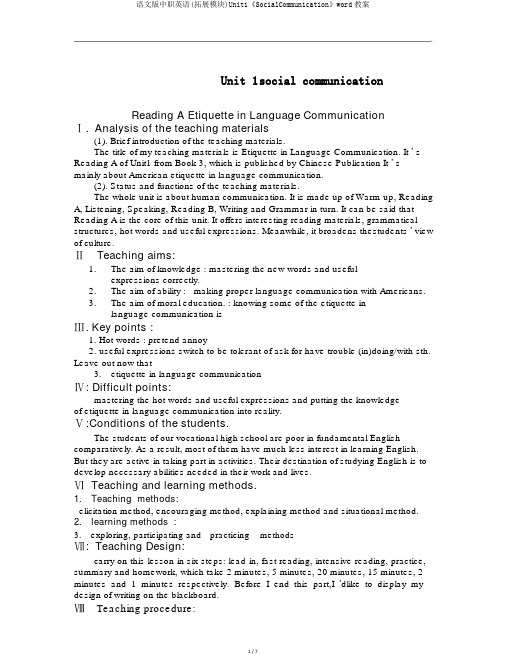
Unit 1s ocial communicationReading A Etiquette in Language CommunicationⅠ. Analysis of the teaching materials(1). Brief introduction of the teaching materials.The title of my teaching materials is Etiquette in Language Communication. It ’ s Reading A of Unit1 from Book 3, which is published by Chinese Publication It ’ s mainly about American etiquette in language communication.(2). Status and functions of the teaching materials.The whole unit is about human communication. It is made up of Warm-up, Reading A, Listening, Speaking, Reading B, Writing and Grammar in turn. It can be said that Reading A is the core of this unit. It offers interesting reading materials, grammatical structures, hot words and useful expressions. Meanwhile, it broadens thestudents ’ view of culture.ⅡTeaching aims:1.The aim of knowledge : mastering the new words and usefulexpressions correctly.2.The aim of ability : making proper language communication with Americans.3.The aim of moral education. : knowing some of the etiquette inlanguage communication isⅢ. Key points :1.Hot words : pretend annoy2. useful expressions switch to be tolerant of ask for have trouble (in)doing/with sth. Leave out now that3.etiquette in language communicationⅣ: Difficult points:mastering the hot words and useful expressions and putting the knowledgeof etiquette in language communication into reality.Ⅴ:Conditions of the students.The students of our vocational high school are poor in fundamental English comparatively. As a result, most of them have much less interest in learning English. But they are active in taking part in activities. Their destination of studying English is to develop necessary abilities needed in their work and lives.ⅥTeaching and learning methods.1.Teaching methods:elicitation method, encouraging method, explaining method and situational method.2.learning methods :3. exploring, participating and practicing methodsⅦ: Teaching Design:carry on this lesson in six steps: lead-in, fast reading, intensive reading, practice, summary and homework, which take 2 minutes, 5 minutes, 20 minutes, 15 minutes, 2 minutes and 1 minutes respectively. Before I end this part,I ’dlike to display my design of writing on the blackboard.ⅧTeaching procedure:Step 1 Lead in (2’)Tell a story , showing some pictures with wrong manners→Find mistakes××①②××③④Then ask the question:“What are wrong manners?”The students needn’tanswer the questionStep 2 fast reading (5)read fast → showing the pictures again→ give their answersThen ask the question:“What we should say/do here?”??①②??③③④Step 3 Intensive reading(20)1.read carefully ,then ask the question:“Why should we behave so?”2.key words and useful expressions→long sentences→ expansionokok②①ok ok③④Key words and expressions:In this step, I ’lltake three steps to present the key words and useful expressions. First, the usage. Then, show one or two model sentences. Last, to get the students to participate and practise, give them one or two sentences as exercises. The exercises can be in different forms, such as, filling in blanks, translating, correcting mistakes, and so on. All the exercises are done by the students themselves.be tolerant of/towards:Usage: be tolerant of/towards +n./ pron .Model sentences:1.Mr. Smith is not very tolerant of/towards others .2.We should always be tolerant of the views of others even if we disagree with them. Exercises:1.Fill in the blank with the right form of the given words:Her own mistakes made her very____( tolerant) of/towards others.Have some/no trouble(in)Usage: have some/no trouble(in) doing sth.Model sentences:I had some trouble (in) reading the letter . His handwriting is very bad.They had no difficulty in understanding what he said.Exercises:Translate the Chinese sentence into English:他们绝不费劲就找到了我的家。
新课标必背英语口语第一单元到第55单元
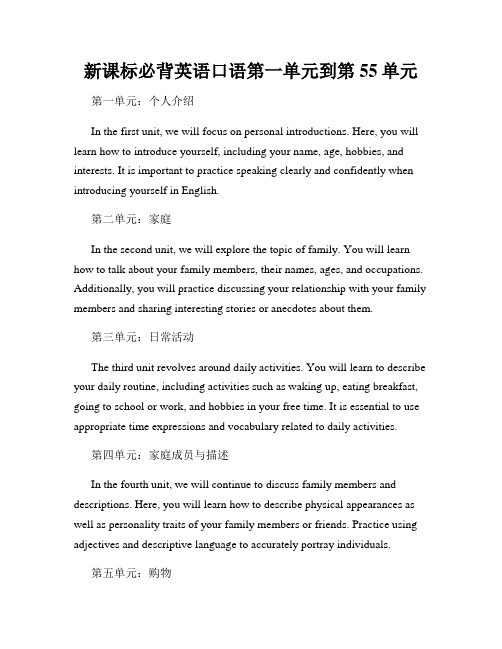
新课标必背英语口语第一单元到第55单元第一单元:个人介绍In the first unit, we will focus on personal introductions. Here, you will learn how to introduce yourself, including your name, age, hobbies, and interests. It is important to practice speaking clearly and confidently when introducing yourself in English.第二单元:家庭In the second unit, we will explore the topic of family. You will learn how to talk about your family members, their names, ages, and occupations. Additionally, you will practice discussing your relationship with your family members and sharing interesting stories or anecdotes about them.第三单元:日常活动The third unit revolves around daily activities. You will learn to describe your daily routine, including activities such as waking up, eating breakfast, going to school or work, and hobbies in your free time. It is essential to use appropriate time expressions and vocabulary related to daily activities.第四单元:家庭成员与描述In the fourth unit, we will continue to discuss family members and descriptions. Here, you will learn how to describe physical appearances as well as personality traits of your family members or friends. Practice using adjectives and descriptive language to accurately portray individuals.第五单元:购物Unit five focuses on shopping. You will learn vocabulary related to different types of stores, clothing, and accessories. Additionally, you will practice asking for help or assistance from salespeople and negotiating prices. This unit will help you navigate various shopping situations fluently in English.第六单元:旅行与交通The sixth unit explores the topic of travel and transportation. You will learn how to talk about different modes of transportation, such as planes, trains, and buses. Additionally, you will practice discussing your travel experiences, destinations, and making travel plans in English.第七单元:餐厅与点餐In unit seven, we will discuss restaurants and ordering food. You will learn vocabulary related to menus, food items, and commonly used phrases for ordering. Additionally, you will practice asking for recommendations and addressing any dietary restrictions or preferences.第八单元:学校与教育Unit eight focuses on the topic of school and education. Here, you will learn vocabulary related to different school subjects, classrooms, and educational experiences. You will also practice discussing your favorite subjects, teachers, and school activities.第九单元:时间与日期The ninth unit explores the concept of time and dates. You will learn how to talk about different times of the day, days of the week, months, andyears. Additionally, you will practice discussing schedules, appointments, and important events.第十单元:常用问答In unit ten, we will cover common questions and answers. You will learn how to respond to questions related to personal information, opinions, and preferences. This unit will help you to engage in conversations and provide thoughtful responses.依此类推,每个单元都按照相应的主题展开教学,以满足新课标英语口语考试的要求。
2023外研版英语必修一unit1using language教案

2023外研版英语必修一unit1using language教案
一、教学目标:
1. 学生能够理解Using Language部分的内容和语境,能够正确使用相关的语言表达。
2. 学生能够通过阅读和讨论,提高跨文化交际的能力。
3. 学生能够通过小组活动,提高合作和沟通能力。
二、教学内容:
本单元的Using Language部分包括一篇阅读文章和相关的语言练习。
阅读文章主要讨论了不同文化背景下的人际交往方式,学生需要通过阅读和讨论,了解不同文化背景下语言表达的差异,并能够在实际生活中正确使用。
三、教学步骤:
1. 导入(5分钟):先引导学生回顾必修一第一单元的学习内容,再引入本单元的话题:不同文化背景下的语言交际。
2. 阅读文章(15分钟):让学生阅读文章,并解释文章中的一些重点词汇和表达。
3. 语言练习(20分钟):进行相关的语言练习,例如填空、选择题、作文等。
在练习中,应注意突出本单元的重点话题——不同文化背景下的语言交际。
4. 小组活动(25分钟):将学生分成若干小组,让他们讨论并回答一些与本单元话题相关的问题。
这些问题应与实际生活紧密相关,有助于提高学生的兴趣和参与度。
5. 反馈与总结(5分钟):教师对学生的学习情况进行反馈和总结,指出学生在学习中存在的问题,并给出相应的建议。
6. 布置作业(1分钟):让学生在家中继续讨论本单元的话题,并尝试用英语写一篇短文,谈谈在不同文化背景下如何进行有效的语言交际。
四、教学反思:
在教学过程中,应注意观察学生的参与度,以及他们在活动中的表现。
同时,应反思自己的教学方式和引导是否得当,以便在今后的教学中不断改进。
Unit 1 Invitation Etiquette英语实用

Trying Your Hand
Unit | One
Imitating Mini-Talks
Acting out the Tasks
Studying Invitation Cards and Letters Following Sample Dialogues Putting Language to Use
Back
Unit | One
Script: Mike: What are you going to do tomorrow? Got any plans? Claire: Not at all. Do you have any suggestions? Mike: How about going to the ball game? Claire: Hmm. I don’t really feel like going to watch the ball game. Any other ideas? Mike: Would you like to go skiing tomorrow? Claire: That sounds great. I haven’t gone skiing for a long time. But wait a minute! Isn’t it supposed to be very warm tomorrow? Mike: Gee, I haven’t heard of that. Claire: I’m pretty sure it’s supposed to be very warm. I heard it on the radio. Mike: In that case, going skiing wouldn’t be a very good idea. Let’s wait and see what the weather will be like tomorrow. Claire: Okay. I’ll call you in the morning.
北师大版高中英语必修1 Unit1__Communication__Workshop参考课件

Stamp
Wang Jian ping 105 Dong Feng Street, Beijing
Listen and complete the table
Questions How much TV ? Favourite TVprogramme Favourite music ? Favourite clothes ?
Language is the most important tool in communication. There are two kinds of languages ----spoken and written.
Another language is body language. It useful to people who can speak or can’t understand each other’s language.
1) About the person you are writing
To whom
When to meet last
Where to meet last
What used to Hobbies be
2. About yourself
Doing now Past interest Present
Events
friend? 7. What is Wang Ying doing?How can you know
Wang Ying has changed a lot? 8. Why did she have to stop writing?
Task 2
How to write a letter
1.The Heading
2.The Greeting
外研社高中英语必修一第一单元 Understanding ideas-Language points

Period IILearning contents: Language points (Reading)Learning aims:To know more use of the expressionsTo put the expressions into practiceLearning procedures:Step 1: Revision1.Have a dictation of some words.2.Check the homework.Step 2: Language study✧Words explanation1. After I had pictured it over and over again in my mind, the big day finally arrived (Para. 1)picture v. to imagine something, especially by creating an image in your mind.【多维训练】1)我还能回忆起我童年时住的那所房子。
______________________________________________________________________________2)I tried to picture what it would be like to live without my friends._____________________________________________________________________________n. 给某人拍照_____________________2. What could I say to make a good first impression? (Para.5)impression: an opinion or feeling you have about someone or something you have seen but do not know very well.【用法提炼】【多维训练】单句语法填空①The film‘s special effects are particularly _______________ .(impress)②I was very __________(impress) by the efficiency of the staff.③The book left a deep ___________(impress) on him.④___________(impress)by the beautiful scenery, I forgot to go back home in time.3. Although I was embarrassed, his words made me a lot more relaxed! (Para.6)embarrassed: shy or ashamed, especially in a social situation. 【多维训练】我一生中从未因身高感到如此难堪过!_______________________________________________________________________________relaxed: calm and not anxious or worried比赛前,他显得轻松而自信。
Unit1 Etiquette in Language Communication 拓展 精讲

• switch to转向 • They switched the talk to a more interesting subject. • 他们把谈话转到比较有趣的话题上去了 。 • 他原来学数学,后来改学英语。 • He studied Math and then switched to English.
• at least至少 • It will cost at least 500 dollars. • 这个东西至少要花500美元。 • She must be at least 40。 • 她至少应该有40岁了。 • 人们每天应该喝至少八杯水。 • People should drink at least 8 cups of water every day.
?你应该做好自己面对人生的准备?你准备好出去了吗
Etiquette in Language Communication
• • • • •
be tolerant of对...宽容,体谅 She was tolerant of different views. 她容忍不同的意见。 我们应该学会宽容他人。 You should learn to be tolerant of others. • have trouble (in) doing sth. 在做某事上有麻烦 • He has trouble in learning English. • 他在学英语方面有麻烦。
• pretend to do sth.假装做... • She didn't love to drink wine,though she pretended to. • 她并不喜欢喝酒,虽然她装出喜欢 喝的样子。 • 他假装没看见。 • He pretended not to see.
etiquette英语篇目

etiquette英语篇目Etiquette, also known as good manners or social graces, plays a significant role in our daily lives. It refers to the code of conduct that guides our behavior in various social situations. Having good etiquette not only promotes positive interactions but also reflects our respect and consideration for others. In this article, we will explore different aspects of etiquette in the English-speaking world.One important aspect of etiquette is greeting others. In English-speaking countries, a firm handshake and maintaining eye contact while greeting someone is considered polite. It is customary to say 'hello' or 'hi' followed by the person's name or a simple 'how are you?' when meeting someone for the first time or in a formal setting. Additionally, saying 'please' and 'thank you' is essential in showing gratitude and politeness in everyday interactions.In social gatherings or formal events, it is important to be mindful of appropriate table manners. English dining etiquette often involves using utensils in a specific manner. For example, one should hold the knife in the right hand and fork in the left hand while cutting food, and then switch the fork to the right hand to eat. It is considered impolite to speakwith food in your mouth or to reach across the table for something. Waiting for everyone to be served before starting to eat is also a common practice.In terms of communication, it is important to be aware of cultural differences and adapt accordingly. English-speaking cultures often value personal space, so it is important to maintain an appropriate distance while speaking to someone. Interrupting others while they are speaking is considered impolite, and it is better to wait for them to finish before adding your input. Active listening, nodding, and maintaining eye contact are considered signs of respect and attentiveness during conversations.Another essential aspect of etiquette is respecting personal boundaries. In English-speaking countries, it is important to ask for permission before touching someone or entering their personal space. For example, hugging or kissing on the cheek may not be appropriate unless you are close friends or family members. Additionally, respecting others' privacy and not prying into personal matters is considered polite. In formal settings, such as the workplace or academic environment, etiquette plays a crucial role in maintaining professionalism. Dressing appropriately, being punctual, andaddressing superiors or colleagues with respect are all important aspects of professional etiquette. It is also customary to use formal language and avoid using slang or informal expressions in these settings.Overall, understanding and practicing good etiquette in the English-speaking world can greatly enhance our social interactions and relationships. It shows our respect for others, promotes a positive atmosphere, and helps us navigate different social situations with ease. By following the principles of etiquette, we can create a more harmonious and considerate society.。
- 1、下载文档前请自行甄别文档内容的完整性,平台不提供额外的编辑、内容补充、找答案等附加服务。
- 2、"仅部分预览"的文档,不可在线预览部分如存在完整性等问题,可反馈申请退款(可完整预览的文档不适用该条件!)。
- 3、如文档侵犯您的权益,请联系客服反馈,我们会尽快为您处理(人工客服工作时间:9:00-18:30)。
• so that为了,以便 • I gave you a map so that you wouldn't get lost. • 我怕你迷路,给过你一张地图。 • She worked hard so that everything should be ready in time. • 她努力工作,为的是及时做好各项准备 。
• leave out忽视、忽略、遗忘 • She left out a "c" in "account" . • 她在"account"这个词中漏掉了一个"c" 。 • 我们不应该遗忘历史。 • We should not leave out the historபைடு நூலகம்.
• be ready to do 准备做... • You should be ready to face your life by yourself. • 你应该做好自己面对人生的准备 • 你准备好出去了吗? • Are you ready to go out?
• switch to转向 • They switched the talk to a more interesting subject. • 他们把谈话转到比较有趣的话题上去了 。 • 他原来学数学,后来改学英语。 • He studied Math and then switched to English.
• at least至少 • It will cost at least 500 dollars. • 这个东西至少要花500美元。 • She must be at least 40。 • 她至少应该有40岁了。 • 人们每天应该喝至少八杯水。 • People should drink at least 8 cups of water every day.
• in the middle of在...中间 • She came in the middle of the day. • 她在中午的时候来了。 • 她坐在教室中间。 • She sits in the middle of the classroom.
• now that既然 • You should have a good rest now that you've finished the work. • 既然已完成了工作,你就应该好好 休息一下。
Etiquette in Language Communication
• • • • •
be tolerant of对...宽容,体谅 She was tolerant of different views. 她容忍不同的意见。 我们应该学会宽容他人。 You should learn to be tolerant of others. • have trouble (in) doing sth. 在做某事上有麻烦 • He has trouble in learning English. • 他在学英语方面有麻烦。
• pretend to do sth.假装做... • She didn't love to drink wine,though she pretended to. • 她并不喜欢喝酒,虽然她装出喜欢 喝的样子。 • 他假装没看见。 • He pretended not to see.
• ask (sb.) for sth.要求(某物) • She asked for a glass of iced tea instead of beer. • 她要了一杯冰茶而不是啤酒。 • Can I ask you for help? • 能请你帮个忙吗?
